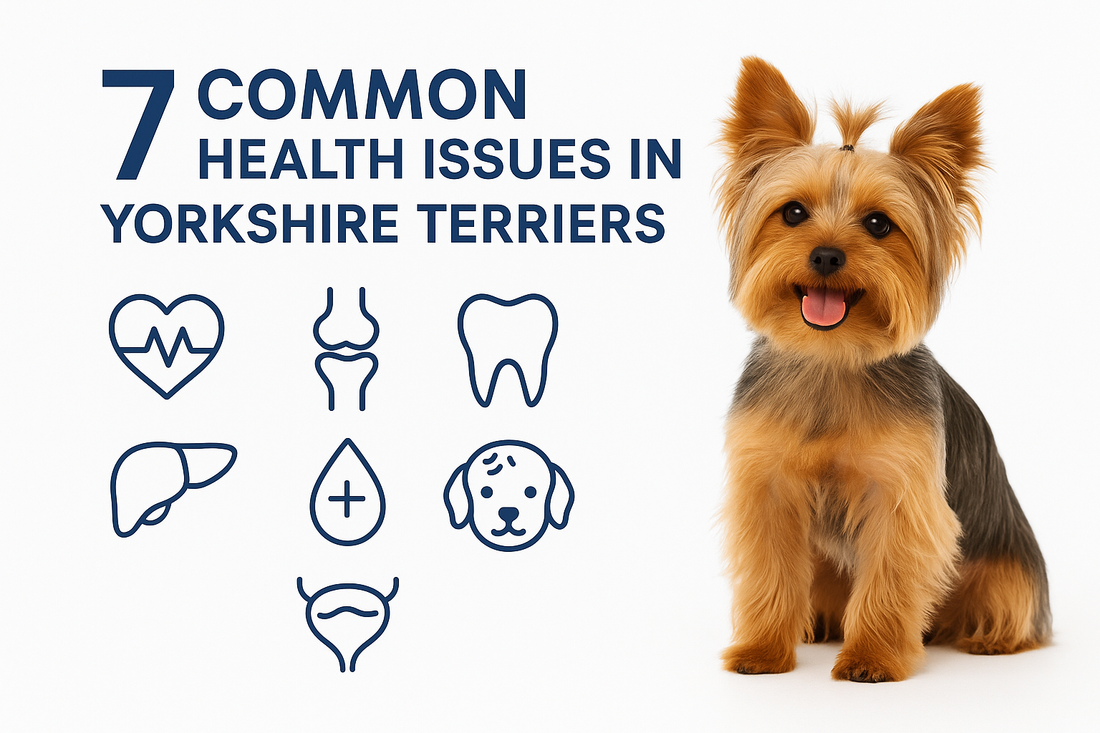
🐶 7 Common Health Issues in Yorkshire Terriers – Prevention and Care Guide
7 Common Health Issues in Yorkshire Terriers – Prevention and Care Guide
Why Yorkshire Terriers Require Special Health Attention
The Yorkshire Terrier, or Yorkie, is one of the most popular toy breeds, known for its small size, big personality, and affectionate nature.
However, Yorkies are genetically prone to certain health conditions that owners must proactively monitor and manage.
This article outlines the 7 most common health issues in Yorkshire Terriers and offers practical tips for prevention and care.
⚠️ 7 Common Health Issues in Yorkshire Terriers
1. Tracheal Collapse
Yorkies have a narrow and sensitive trachea, making them prone to chronic coughing, wheezing, and breathing difficulties.
-
Prevention: use a harness instead of a collar, avoid overexcitement
-
Treatment: bronchodilators, cough suppressants, and oxygen therapy if needed
2. Patellar Luxation
As a small breed, Yorkies frequently suffer from kneecap dislocation, one of the most common health issues in Yorkshire Terriers.
-
Prevention: maintain ideal weight, use anti-slip flooring
-
Treatment: physical therapy for mild cases, surgery for severe ones
3. Dental Disease
Yorkies have a small jaw with crowded teeth, increasing the risk of plaque buildup, gingivitis, and tooth loss.
-
Prevention: daily brushing, dental sprays, and dental chews
-
Management: professional cleanings and extractions as needed
4. Portosystemic Shunt (PSS)
A congenital liver disorder often found in Yorkies, where blood bypasses the liver, leading to toxin buildup in the bloodstream.
-
Symptoms: lethargy, poor appetite, vomiting, disorientation
-
Diagnosis: bloodwork and ultrasound
-
Treatment: special diets, liver supplements, and surgery in some cases
5. Hypoglycemia (Low Blood Sugar)
Young or tiny Yorkies are especially prone to sudden blood sugar drops, which can be life-threatening if not treated promptly.
-
Prevention: feed 3–4 small meals a day
-
Emergency care: apply honey or corn syrup to the gums and visit a vet
6. Allergic Dermatitis
Yorkies have sensitive skin and may suffer from food allergies, environmental allergens, and flea reactions.
-
Symptoms: excessive scratching, red patches, licking, flaky skin
-
Prevention: hypoallergenic diet, flea control, and skincare routines
-
Management: antihistamines, corticosteroids, and topical treatments
7. Urinary Tract Issues (UTIs and Bladder Stones)
Due to limited water intake and small bladder size, Yorkies are at risk for urinary infections and stone formation.
-
Prevention: encourage water intake, feed urinary-health diets
-
Treatment: antibiotics, prescription food, or surgery in severe cases
🛡️ Tips to Keep Your Yorkie Healthy
-
Brush teeth daily and keep eyes and ears clean
-
Use non-slip mats and joint cushions
-
Feed small, frequent meals to prevent hypoglycemia
-
Schedule regular liver and kidney function tests
-
Avoid allergens like dust mites and pollen
🛒 Recommended Products for Yorkshire Terrier Health
-
Joint supplements and orthopedic mats
-
Dental sprays and tartar-control treats
-
Liver support formulas and special diets
-
Ear cleaning solutions and gentle skin moisturizers
👉 Shop Yorkie Health Products
External Resource (DoFollow)
Reference: American Kennel Club – Yorkshire Terrier Health
Internal Resource
👉 Related article: Common Health Issues in Chihuahuas – Prevention Guide
🧩 Frequently Asked Questions (FAQ)
Q1. My Yorkie coughs like it’s choking. Could it be tracheal collapse?
A1. Yes. A persistent cough or honking sound, especially when pulling on a leash, could indicate tracheal collapse.
Use a chest harness and consult your vet.
Q2. What is the most serious health concern in Yorkshire Terriers?
A2. Patellar luxation, liver shunts (PSS), and hypoglycemia are among the most serious,
requiring early detection and continuous monitoring.
Q3. How do I know if my Yorkie has a liver problem?
A3. Symptoms like lethargy, poor appetite, or strange behavior may signal liver issues.
Request blood tests and imaging from your veterinarian.

